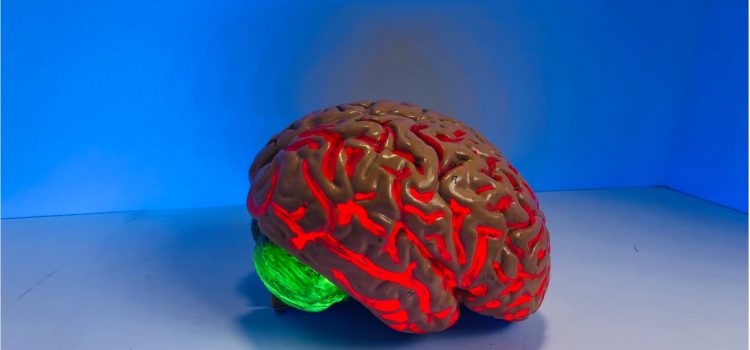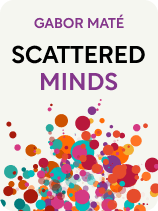

This article is an excerpt from the Shortform book guide to "Scattered Minds" by Gabor Maté. Shortform has the world's best summaries and analyses of books you should be reading.
Like this article? Sign up for a free trial here.
What is ADHD? How is the brain affected by ADHD?
In Scattered Minds, Gabor Maté says that ADHD, which stands for Attention-Deficit Hyperactivity Disorder, is a neurodevelopmental condition. If you have ADHD, it’s because your brain works differently than others.
Keep reading to learn more about ADHD and the brain’s way of responding to the condition.
What It Feels Like to Have ADHD
Maté explains that if you have ADHD, you experience at least two of three primary symptoms: difficulty with attention, difficulty with impulse control, and difficulty with stillness. You may also struggle with secondary symptoms, including difficulty with self-esteem and difficulty with relationships. Let’s explore each to understand more about ADHD and the brain.
Difficulty With Attention
If you have difficulty with attention, you’re unable to focus on what you’re doing unless you’re already highly motivated to do it. For example, you might find it easy to get into the zone when you’re working on a hobby but feel unable to pay attention to activities you don’t enjoy, like your taxes. Maté says that this can lead you to procrastinate on things you don’t enjoy until the time crunch motivates you to focus and take action, which can stress you out and prevent you from achieving your goals.
Difficulty With Impulse Control
If you have difficulty with impulse control, you act on your first instinct without thinking about the consequences of your actions. For example, Maté says that you might feel unable to stop yourself from frequently interrupting others instead of waiting your turn to speak. You may also feel like you have to do or get what you want right now—even if it’s not in your best interest.
Difficulty With Stillness
If you have difficulty with stillness, you simply can’t tolerate inactivity, so you’re always in motion. You may stay physically still for long periods of time—like when you’re procrastinating on a work assignment—but that stillness isn’t restful; the whole time, you’re thinking about the other things you need to be doing. Maté says that this often presents as anxiety—you’re not merely active, you’re restless and worried.
Secondary ADHD Symptoms
You may also have secondary symptoms, like difficulty with self-esteem and relationships. Maté explains that you only experience these secondary symptoms because your primary symptoms adversely impact the way you interact with the world.
You might have difficulty with self-esteem if your ADHD symptoms have interfered with your ability to achieve your goals. For example, Maté notes that difficulty with attention can contribute to poorer memory that may affect your performance at work and derail your career. Not doing as well as you’d like to may lead you to feel inadequate.
You might have difficulty with relationships if your ADHD symptoms make it hard for you to follow social rules or meet others’ standards. For example, Maté notes that difficulty with impulse control can result in emotional outbursts—in a conflict, you might say the first thing that comes to mind, even if it isn’t kind or constructive, which intensifies the conflict and ultimately distances you from others.
Why You Have an ADHD Brain
According to Maté, you experience ADHD symptoms because your brain developed atypically. Now, we’ll explain why your brain developed atypically. First, we’ll discuss Maté’s biopsychosocial approach to the origins of ADHD. Then, we’ll discuss how biological and social factors lead to the psychological symptoms associated with ADHD.
The Biopsychosocial Approach to ADHD
Maté says that when he wrote this book, most experts believed that ADHD had exclusively biological origins—you’d only develop ADHD if you inherited the genes responsible for it. He argues that ADHD actually has biological, psychological, and social causes, and provides two justifications for a biopsychosocial approach to ADHD.
Maté’s first argument for why ADHD can’t be purely genetic is that genes are merely blueprints that tell your body how to organize itself. How your body expresses a given genetic trait as you grow up depends on environmental factors—the circumstances you live in.
Maté also argues that when interpreted correctly, research supports the view that ADHD isn’t exclusively biological in origin. Studies show that if you’re related to someone with ADHD, you’re more likely to have ADHD yourself—this is often taken to suggest that ADHD has a significant biological basis, but Maté says relatives often also share the same environments, and your environment can have an equally significant impact on your psychological development.
The Role of Genetics in ADHD
Maté says that the genetic basis of ADHD is a sensitive temperament, which predisposes you to ADHD by making you more susceptible to environmental stress. If you inherited a sensitive temperament, you’re biologically primed to readily pick up on and have more intense reactions to physical and emotional stimuli.
According to Maté, sensitivity can be advantageous—since you’re more attuned to the world around you, you take notice of the world’s most subtle complexities, and you’re given to feelings like awe, wonder, and appreciation. With those strengths under your belt, you could fill an important creative or spiritual role in society.
But sensitivity can also be disadvantageous because it makes you more likely to be negatively affected by your environment. For example, Maté cites studies that say people with ADHD are more likely to have allergies, lower pain tolerance, and higher emotional reactivity—their responses to both positive and negative emotions are just more extreme. If you’re more susceptible to environmental stress, you’re more likely to suffer the negative effects of stress—including the harmful impacts it can have on your developing brain.
The Role of Childhood Stress in ADHD
Based on anecdotal evidence from his life and the lives of his patients, Maté believes that the psychosocial basis of ADHD is early childhood stress.
Maté says that early childhood stress includes obvious stressors like neglect, abuse, or separation from your parents—but if you’re genetically predisposed to be highly sensitive, you were probably stressed by even the most subtly negative social interactions. Your parents may have been very loving and attentive toward you, but if they were stressed themselves, your home may have had an imperceptibly tense emotional atmosphere. Your sensitive temperament gave you greater, unconscious awareness of that tension—for example, on some level you may have noticed that your parents didn’t smile at you often enough. As a result, you became stressed too, even if you weren’t consciously aware that you felt stressed.
How the Parent-Child Bond Affects Your Development
Maté explains that the parent-child bond influences your cognitive-emotional development in two ways:
First, consistently positive parent-child interactions produce positive feelings, which set off neurochemical processes that promote the physical growth of your brain by building new neural pathways and strengthening existing connections. On the other hand, if you don’t have consistently positive interactions with your parents, you become physiologically stressed. Stress sets off a neurochemical reaction that inhibits neural growth. If you endured a lot of early childhood stress, your brain simply didn’t have the opportunity to develop as it typically would.
Maté argues that the neurological effects of early childhood stress can be seen most clearly in the prefrontal cortex (PFC), which studies suggest is underdeveloped in people with ADHD. The PFC is the part of your brain responsible for managing attention, impulse control, and stillness—if your PFC is underdeveloped, you lack the physiological structure needed to support typical functioning in those areas.
Second, consistently healthy parent-child interactions teach you important psychological skills—like how to manage your attention, control your impulses, and regulate stillness. For example, Maté explains that you typically learn how to pay attention by having positive interactions with your parents—you want more of the feel-good endorphins these interactions give you, so you learn to focus on your parents when they’re focused on you.

———End of Preview———
Like what you just read? Read the rest of the world's best book summary and analysis of Gabor Maté's "Scattered Minds" at Shortform.
Here's what you'll find in our full Scattered Minds summary:
- How ADHD is caused by early childhood stress that hinders development
- Why medication isn't the best way to treat ADHD
- How society can prevent ADHD in future generations






